With a rainbow-colored, black-power-fist emoji, Republicans like Texan John Cornyn lecture us that Juneteenth is “a history lesson that must be taught,” while libertarian Rand Paul offers up platitudes that Juneteenth is a celebration of “the inherent freedoms we share as Americans.” Man, do I feel the freedom, y’all!
Kristi Noem, a supposed hero of federalism, quotes the deceptive and deified Gettysburg Address, saying that “the new Juneteenth Holiday celebrates & honors Lincoln’s words.” Heritage Foundation president Kay C. James says it’s a “teachable moment” for our “exceptional nation.” Even typically common-sense pundits like Julie Borowski are adopting the leftist language of “enslavement” to virtue signal for the new holiday. Ugh, a flourishing vineyard America is not.
The fake nationalization of Juneteenth (an annual occasion with Texas-only roots), its rebranding for the uninformed masses, and its fictional aim at bettering race relations really is too much for a sane person to bear. Why even try to counter the cacophony of presentism surrounding this “celebration of nothing” or the sheer ignorance bubbling up from the cauldron of anti-white reactionaries? After all, the Twitter “experts” demand that Dishonest Abe’s Emancipation Proclamation “freed the slaves.” Get your history right, racists!
The politicians are so busy waxing ahistorical about how “free” we are today, even though the evil empire was codified through blood and fire in 1865 and will-to-power progressives (and their scalawag Republican henchmen) are increasingly creating a society in which my white, straight, Southern, gun-owning, homeschooled Christian sons are second-class citizens, that there’s really no point in challenging the disinformation campaign. Ben and Jerry’s will have a Juneteenth flavor filled with dark chocolate chips and absolutely zero vanilla, and by golly you will buy a pint and bend yet another knee, citizen.
So while the quislings stroke their own egos and set the stage for blacktivists and their allies to have Juneteenth replace the 4th of July as the celebration of American independence, let me take this opportunity to push back against this virulent puritanism by simply telling you about something so outrageously in opposition to the status quo that it warms my Carolina heart.
My friend Richard Hines owns an Anglican parish in a tiny town in South Carolina. Back in January, I had the honor of visiting this Palmetto State jewel for the annual Feast of St. Charles the Martyr. Besides being a Southern compatriot, Richard is also a fellow Orthodox Christian. He purchased the church, which was built in 1879, when it was in disrepair and has taken great care of the chapel, filling it with many heirloom items that represent both Eastern and Western Christianity, as well as the American Southland.
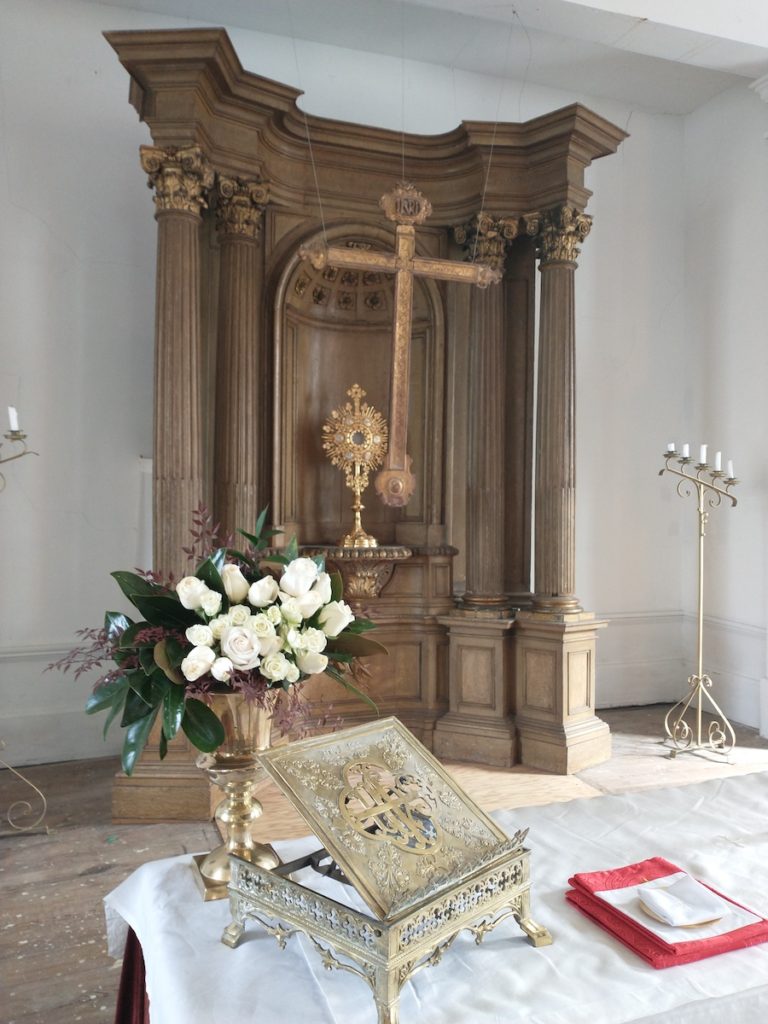
The Anglican altar above dates back to the 16th century, making it older than the States of North and South Carolina, explains Richard. But also housed inside his parish [Neo-Bolshevik Trigger Warning!] is a lovely Confederate Memorial Chapel.
Ironically, the useful idiot Macy Gray wants to push the “transformational” Juneteenth envelope by redesigning the US flag, but little does she know that Southern-without-apology folks have deemed Old Glory “divisive” since 1861. Like the song “I’m a Good Ol’ Rebel” (see bottom of this essay) boldly proclaims:
“I hates the glorious union
‘Tis dripping with our blood.
I hates the striped banner,
And fought it all I could.”
Many of us haven’t been pledging allegiance to its “incorrect” and “democratic” agitprop for a long time, and instead have been flying our own flags of home and heritage. We’ve already got our symbols, and they’ve never been more relevant. You can keep your “tired” and allegedly “representative” flag, Macy, but I will take some of those reparations.
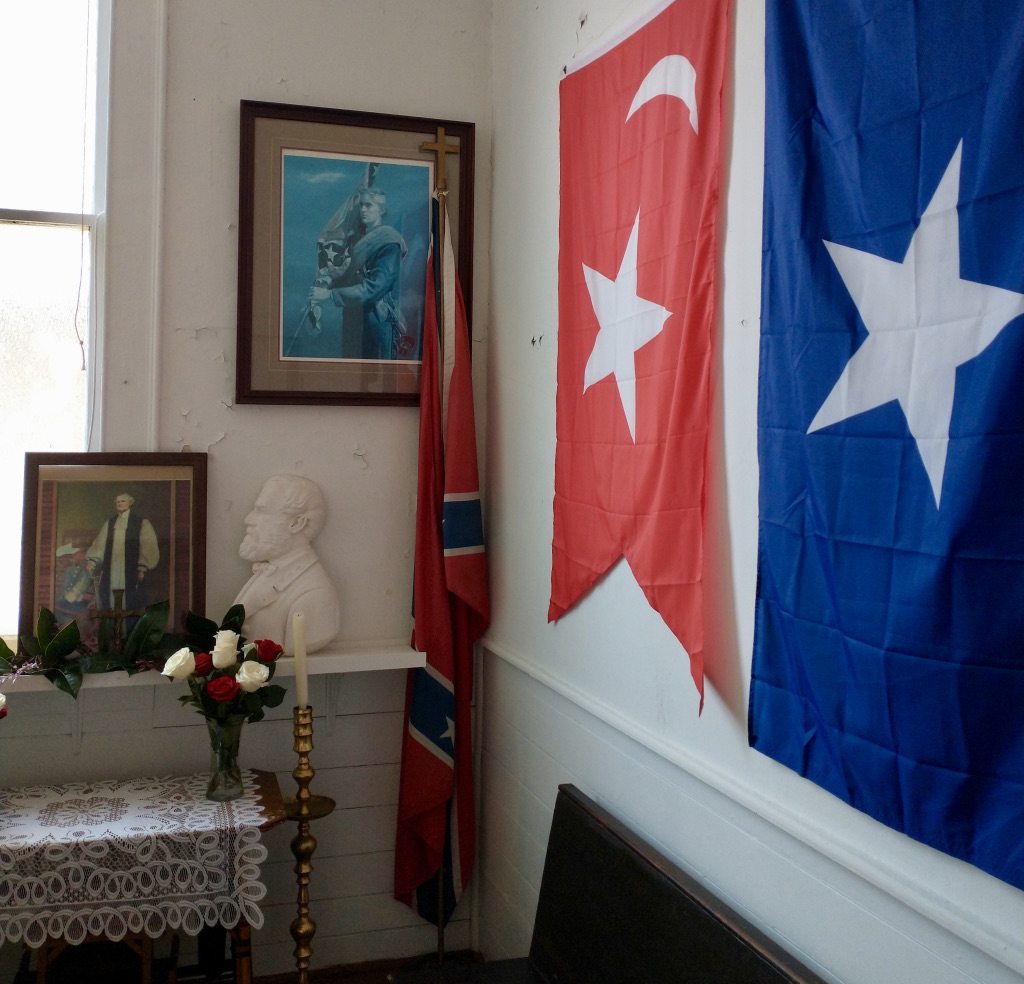
Above: the Confederate Memorial Chapel features the Battle Flag, the SC Secession Flag, the Bonnie Blue Flag, and a bass relief of Robert E. Lee. After the blessing of the Confederate Dead, we sang the first verse of “Dixie” to honor filial piety. Below: The SC Sovereignty Flag and a graphic depicting some of the more well-known flags of the Confederate States of America.
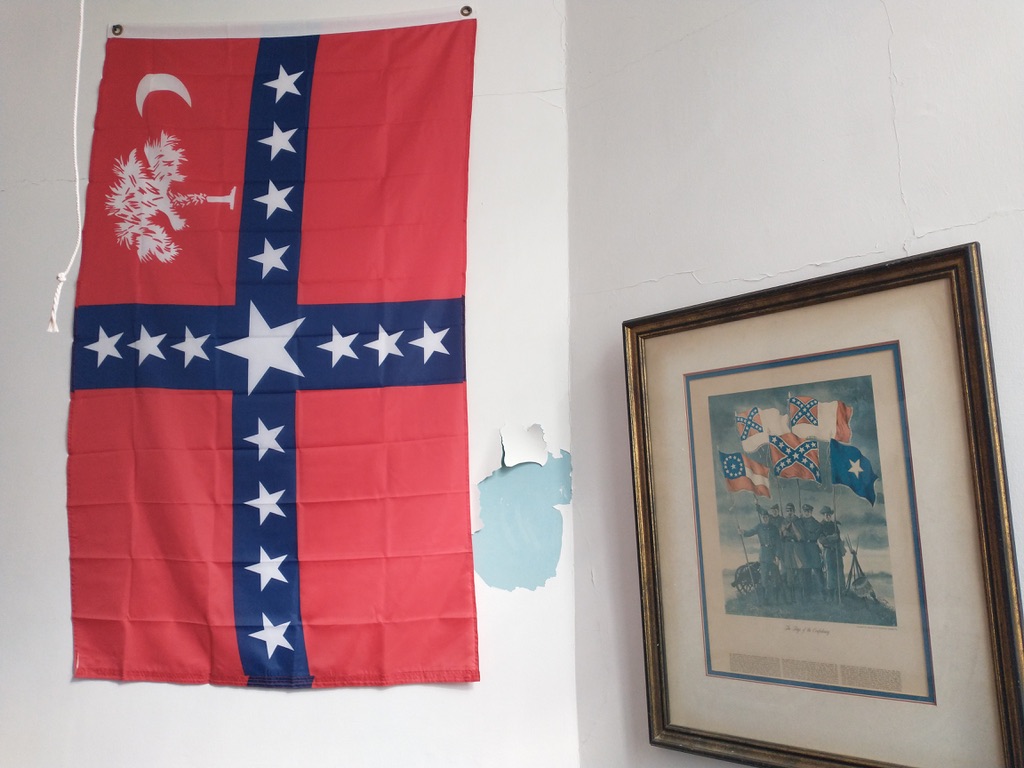
Below: A print of the H.L. Hunley funeral which depicts the ghosts of the 8-man Confederate crew. My friend Paul C. Graham discusses (at the 7:20 mark) the significance of the historic 2004 event which changed his life from mild-mannered Southerner to good ol’ rebel.

The service was Anglican, of course, so as an Orthodox, I could not partake in communion. But I listened and watched intently, taking note of both the differences and similarities of our faiths, and learning more about the Christian heritage of Charles I for whom the Carolinas are named.
“Remember him whose name is thine,
that martyred King of Stuart’s line,
And give thine all to Love divine,
Carolina, Carolina.”
— Offertory Hymn

The Book Common of Prayer (BCP) was one of the prescriptions that Charles I insisted upon to try to keep conformity within English Christianity in both its liturgical practices and social manifestations.
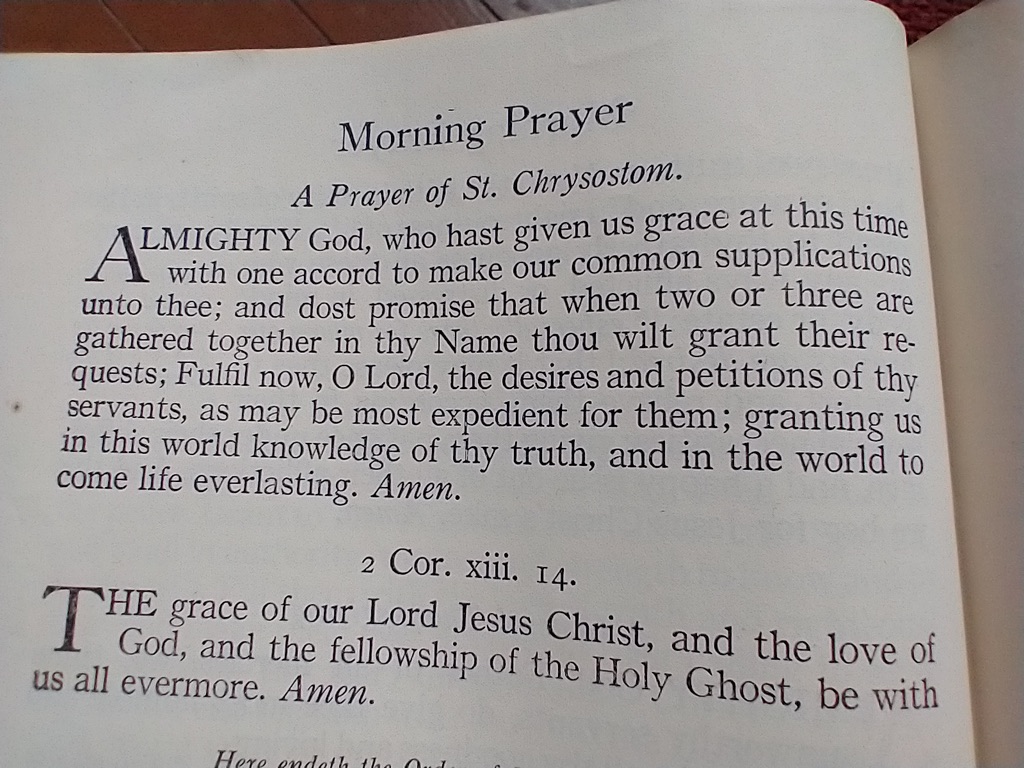
Found on page 20 of the BCP is a prayer of St. John Chrysostom, who was a “golden-mouthed” giant to whom all Christian people’s owe their inheritance.
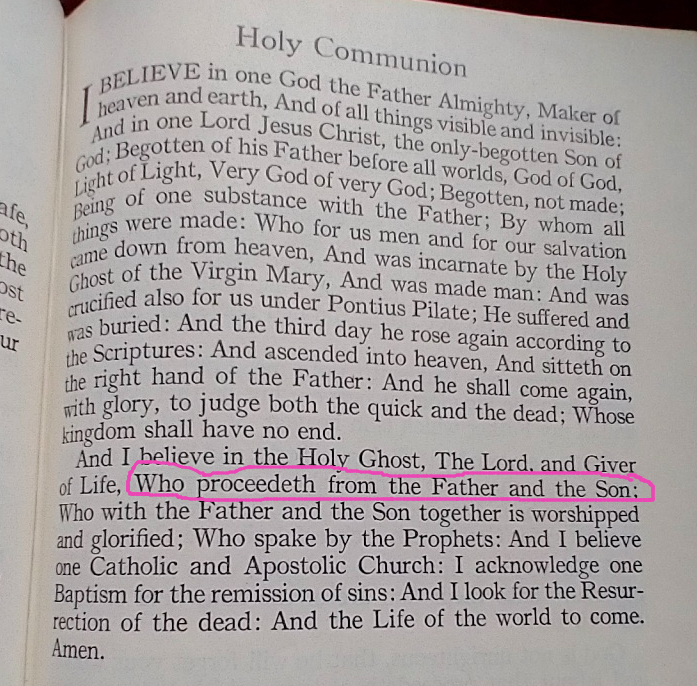
Orthodox Christians recite the the original Nicene-Constantinopolitan Creed, which states that the Holy Spirit proceeds only “from the Father.” The “and the Son” verbiage is known as the Filioque and was added in by the Church of Rome in the 11th century and was “one of the major factors leading to the Great Schism between East and West.”

In part 2 of my Puritans series, I discuss how early New Englanders viewed “King Charles I as Pharaoh, the Atlantic Ocean as the Red Sea, America as the Promised Land, and Boston as the new Jerusalem.” And today’s reformers are just as zealous in their religiosity, but have unfortunately forgotten God in their march toward “progress.”
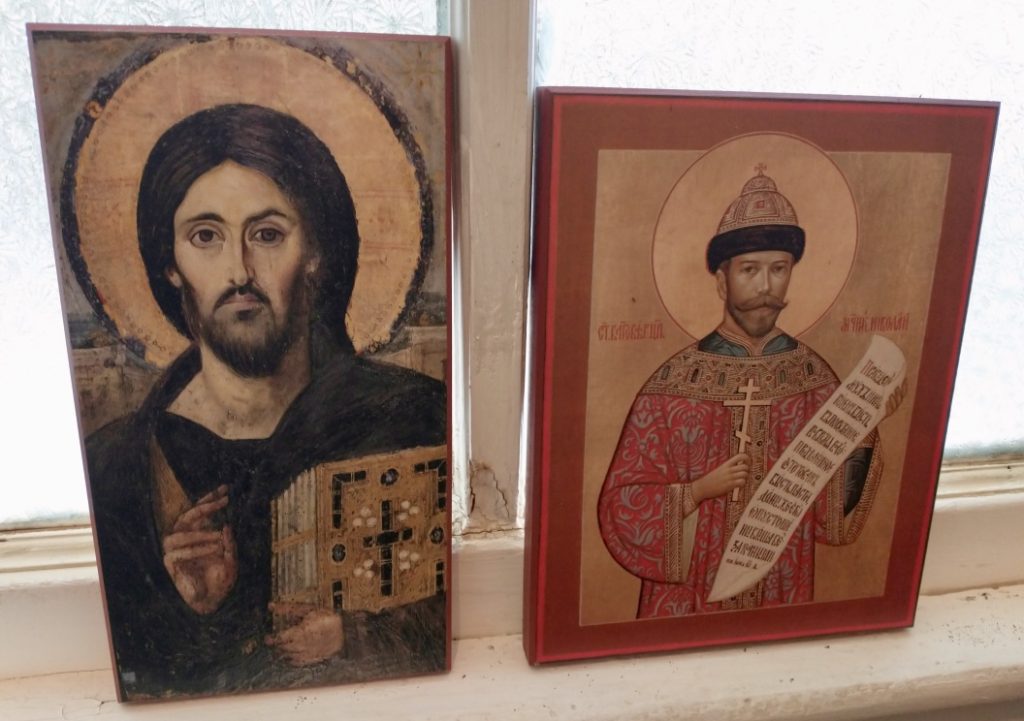
Richard has adorned the parish with beautiful iconography, such as “Christ the Pantocrator” and St. Nicholas II “New Martyr” of Russia.
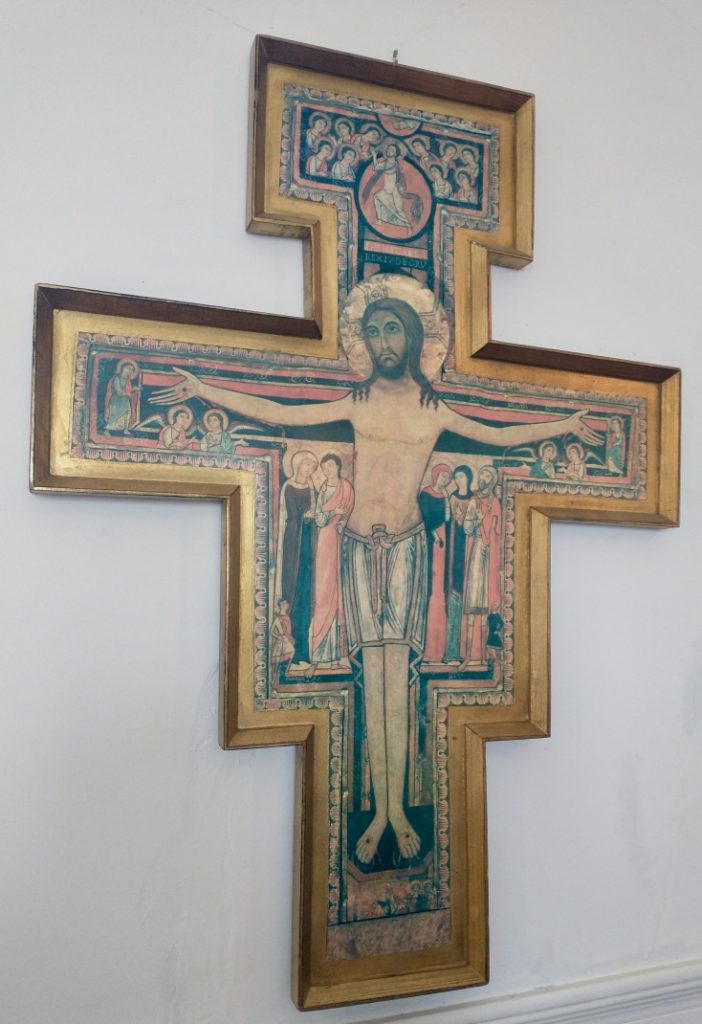
The Gospel reading from that day was from Matthew 21: “Jesus saith unto them, ‘Did ye never read in the scriptures, The stone which the builders rejected, the same is become the head of the corner: this is the Lord’s doing, and it is marvellous in our eyes? Therefore say I unto you, The kingdom of God shall be taken from you, and given to a nation bringing forth the fruits thereof.”
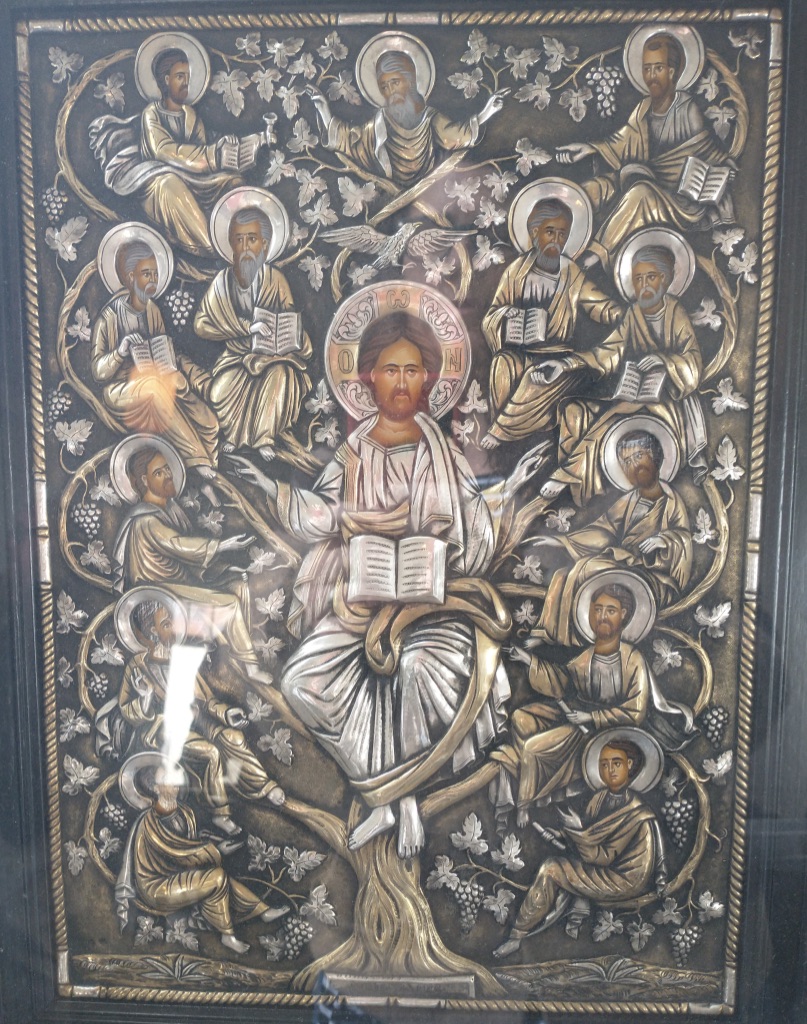
This Parable of the Vineyard means to us Orthodox that “until the Second Coming,” the Church will stand “as long as we are faithful and just as long as we understand Who the Master is and who is the servant, as long as we understand that this is a gift given to us for the working out of our salvation and the salvation of others. As long as we remember that, this vineyard will flourish.”
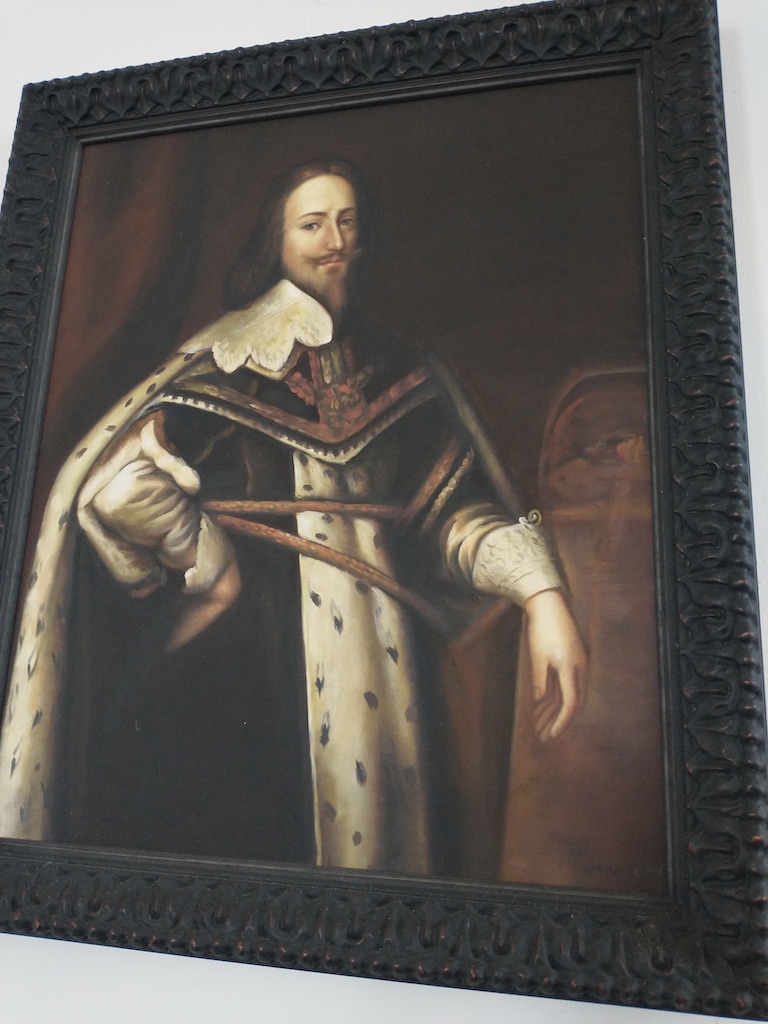
Sure, the mishmash history that makes up These United States doesn’t lead any honest person to really believe that “we” were ever a “Christian nation,” but there are certainly some Christian roots within our polity … depending on where you look.
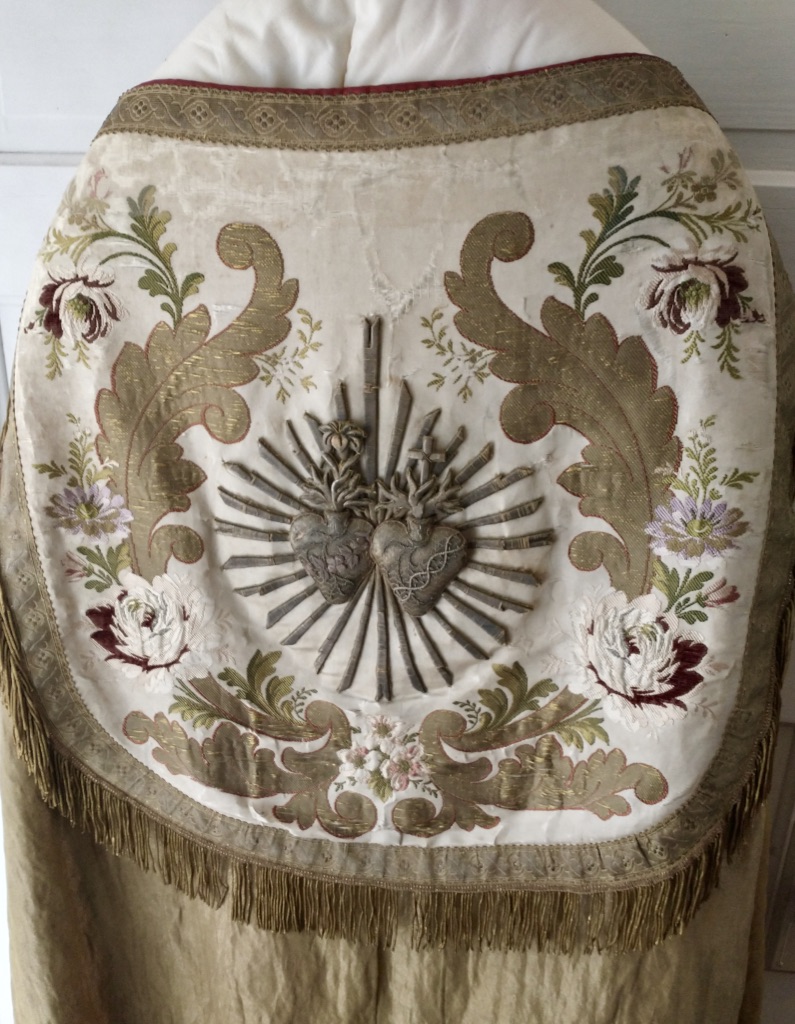
Bishop Paul Hewitt, Anglican Church of North America, wore this French-made Cope dating back to the 18th century. He delivered the homily, which included some additional history on Charles I and some theological and cultural introspection.
“Homily for the Feast of St. Charles the Martyr”
Robert Bork hit the nail on the head with his title “Slouching Toward Gomorrah.” The slope from Christian civilization to paganism is gradual, and pagans still have a sense of virtue and vice. But the slide from paganism to barbarism is steep and slippery. For barbarians, the ultimate moral absolute is power. He who claws his way to the top determines who lives and who dies. His own will to power replaces the rule of law.
In the 1930’s in Germany, Pastor Martin Niemoehler helped start the Confessing Church movement to witness against the barbarian take over of Germany. He lamented how many clergy acted on expediency, as appeasers of the new regime. Only a few acted on principle, the principles elucidated in Holy Scripture and Holy Tradition … the ultimate principle of the Word of God, defending this no matter what the cost.
One commentator has written, “When we consider the state of our nation and our world, the overall ‘mystery of iniquity’ and its fallout, we might be prone to despair. Yet, as we know, this path has been traveled before — and that by our Saviour and saints throughout history.”
In the time of King Charles the First, the central issue was whether the Church of England was going to hold with its ancient Catholic heritage, keeping the Book of Common Prayer and maintaining the historic episcopate, or allow itself to be reduced to a radical protestant denomination. Charles was steadfast in his support of the Church, faithful to the mind of the ancient fathers of the undivided Church. He would shed his blood for this vital commitment.
To some extent Charles was a victim of circumstances partly of is own making. As with all of us, he was, to some extent, the carpenter of his own cross. But because he was a man of great virtue and Christian character, and because he sacrificed his life to defend the Church, he is rightly called a martyr. He died a holy death, with great dignity, forgiving his persecutors and murderers. There is no feast day for Oliver Cromwell, but there are multitudes who remember Charles Stuart the First every year, and seek to follow his example and profit from his prayers.
Today the central theological issue of our time is the Incarnation. Is Jesus God in the flesh or not? This is an even greater issue than Charles faced, because as we get closer to the End, the devil keeps upping the ante. If Jesus is God in the flesh, then He is King of kings and Lord of lords. If He is not, then He is an ethical teacher from Palestine, on a par with Buddha or Mohammed or Confucius.
If He is not God in the flesh, the divine Logos, and He is not Lord of our lives, we can write the rules as we go along. We can re-define human nature without reference to Him. We can redefine masculinity and femininity and the family and make them mean whatever we say they mean. We can say that God made mistakes when he made men and women the way He did, but today we know better and can correct God’s mistakes. We can say that an unborn child, or any life deemed to be inconvenient, is only human when we say it is. Charles was devoted to his wife and family, to the rule of law and to his incarnate Lord, and would be shocked to see our slouch toward Gomorrah.
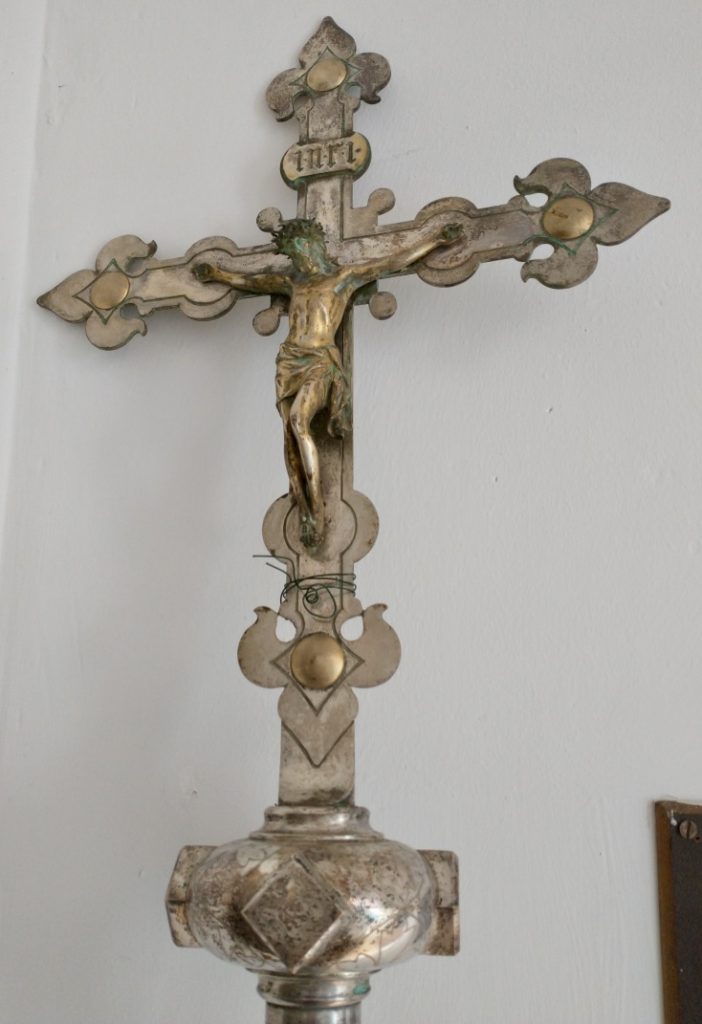
As a New Englander, one of the many things I appreciate about the South is the attention still paid to the gracious life … the life of chivalry, courtesy and manners, exemplified to a high degree by our Patron. The life of courtesy ultimately derives from the court, the Court of the King of kings, the mystical Supper, the Holy Communion. The source of the gracious life is the torrent of grace flowing inexhaustibly from Jesus’ Body and Blood. The gracious life is the “you first” attitude. Our King puts us first. He pours out His life for us. He sheds His Blood for us. The pagan and barbarian gods and goddesses do the opposite. They demand our blood, in war, genocide, abortion and euthanasia. Charles, our Patron, followed the pattern of his King.
Charles was willing to shed his blood for the life of the Church and his subjects. He put God first, the Church second, England third, his family fourth, and himself, last. In the South, there tend to be more men who uphold virtue, and love of God and Country … There tend to be more women who are not trying to be men, or competing with men, but who love what God made them to be. We are all to love our place in the Kingdom of God, where Jesus is known as our Lord, and His Mother as our Lady, and men can learn to be lords, and women can learn to be ladies.
God honors those who honor Him, and the brave sacrifice of Charles the First is honored today more than ever. Our God is so amazing because He brings greater good out of evil, than if the evil had never occurred. Through His Son, our heavenly Father has brought greater good out of Adam and Eve’s fall, than if the fall had never occurred. Through Jesus’ Resurrection, the Father’s ultimate masterpiece, greater good is spread abroad in the Holy Ghost than if Jesus had never been crucified. Our God redeems it all. He redeemed the plight and the suffering of Charles the Martyr. He writes straight with crooked lines in our own lives. He is making all our sufferings resurrectional. In our Communions this morning we will receive the Food of Immortality, resurrection food, the seed of fire which over and over again unites us with Jesus’ mighty Resurrection and makes us partakers of heavenly gladness.
Charles believed all this with heart and soul, and so he was calm and dignified in death. Let us prepare to die as he did, with calm and steady faith, eager for the glory that awaits us. We can see our death as our heavenly birthday, and let God guide our last words. Our forbears attached great importance to the last words of a dying person. St. Catherine of Siena’s were, “God, I thank you for creating me.” Stonewall Jackson’s were, “Let us cross over the river and rest under the shade of the trees.” King Charles’ last utterance was one word, “Remember.”
Today Charles is in the perfect monarchy called Heaven. We will meet him there one day, and today, we sing the Sanctus with him. Heaven is governed by an infinitely perfect, infinitely just, infinitely loving, infinitely glorious Monarch, Jesus the Christ, the Son of God, the King of kings and Lord of lords. There are no parliaments in Heaven, no political parties, no polls, no bureaucracy, and no income tax. No one votes in Heaven. There, God is All in all, and we rejoice to grow forever in our capacity to receive and share the splendour of all He lavishes out, grace beyond grace, and glory beyond telling. Amen.
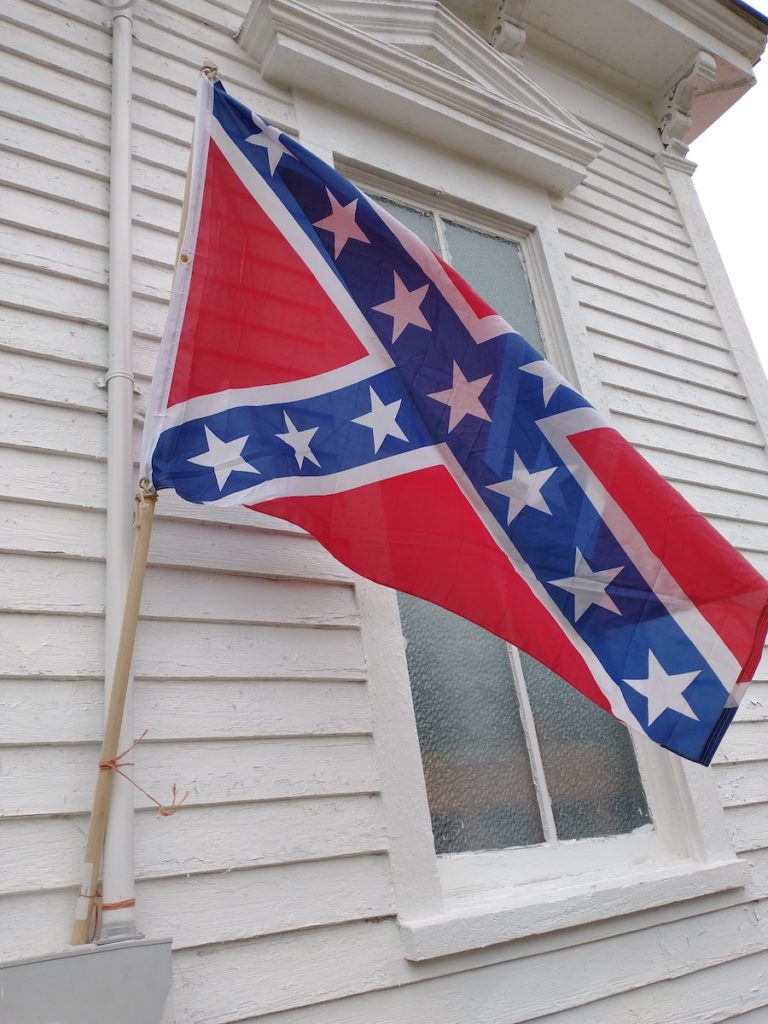
Jefferson Davis understood Dixie’s Charles I connection and the scourge that is puritanical-progressivism. In 1862, he stated to his fellow Confederate countrymen:
“Our enemies are a traditionless and a homeless race; from the time of Cromwell to the present moment they have been disturbers of the peace of the world. Gathered together by Cromwell from the bogs and fens of the North of Ireland and of England, they commenced by disturbing the peace of their own country; they disturbed Holland, to which they fled, and they disturbed England on their return. They persecuted Catholics in England, and they hung Quakers and witches in America.“
“Having been hurried into a war with a people so devoid of every mark of civilization you have no doubt wondered that I have not carried out the policy, which I had intended should be our policy, of fighting our battles on the fields of the enemy instead of suffering him to fight them on ours. This was not the result of my will, but of the power of the enemy.”
Non incautus futuri (“Be mindful of the future”) is the Lee family motto, but we must also remember, for this seemingly small act can foster great strength in dismantling the raw power of the same old, tired purges, propaganda, and persecution, radical reforms and reconstructions, tyranny and totalitarianism. Stay resilient and know that you are in good company, rebels. That is truly a cause to celebrate.
Originally published June 19, 2021, at DissidentMama.net.
Truth warrior, Jesus follower, wife, and boymom. Apologetics practitioner for Orthodox Christianity, the Southern tradition, homeschooling, and freedom. Recovering feminist-socialist-atheist, graduate of the University of Wisconsin-Madison, and retired mainstream journalist turned domesticated belle and rabble-rousing rhetorician. You can read her blog at Dissident Mama.

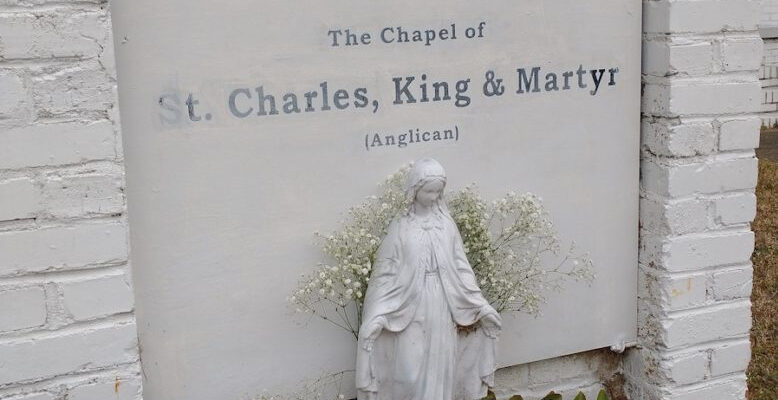

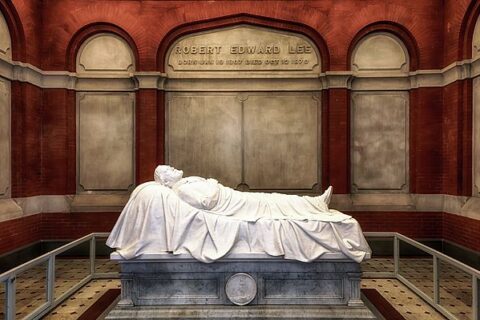
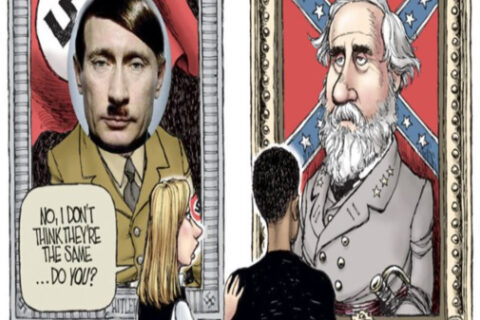


Thanks for a wonderful essay, Dissident Mama. Reading the text of President Davis’s speech to the Mississippi legislature, it brought to mind how articulate the man was. Compare Mr Davis’s speech to those of the mumbling, incoherent current president of the Yankee empire.